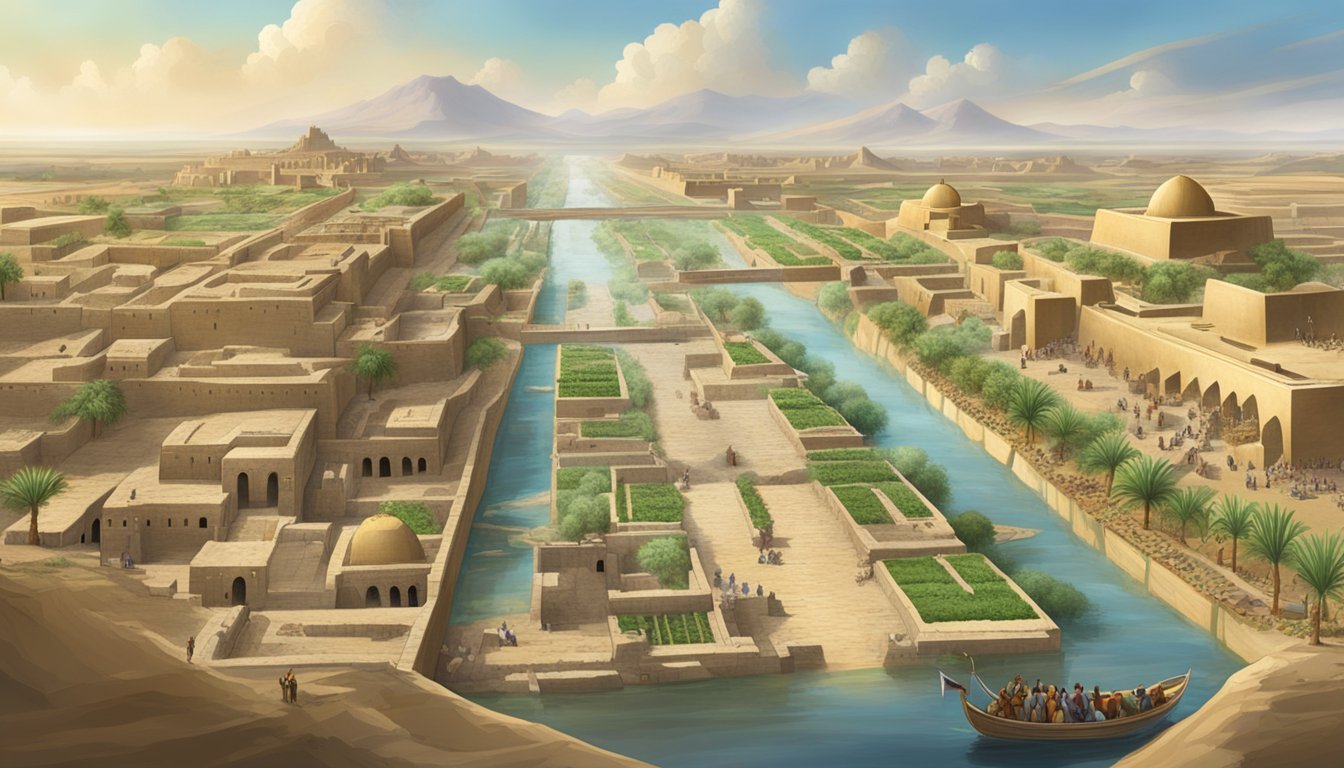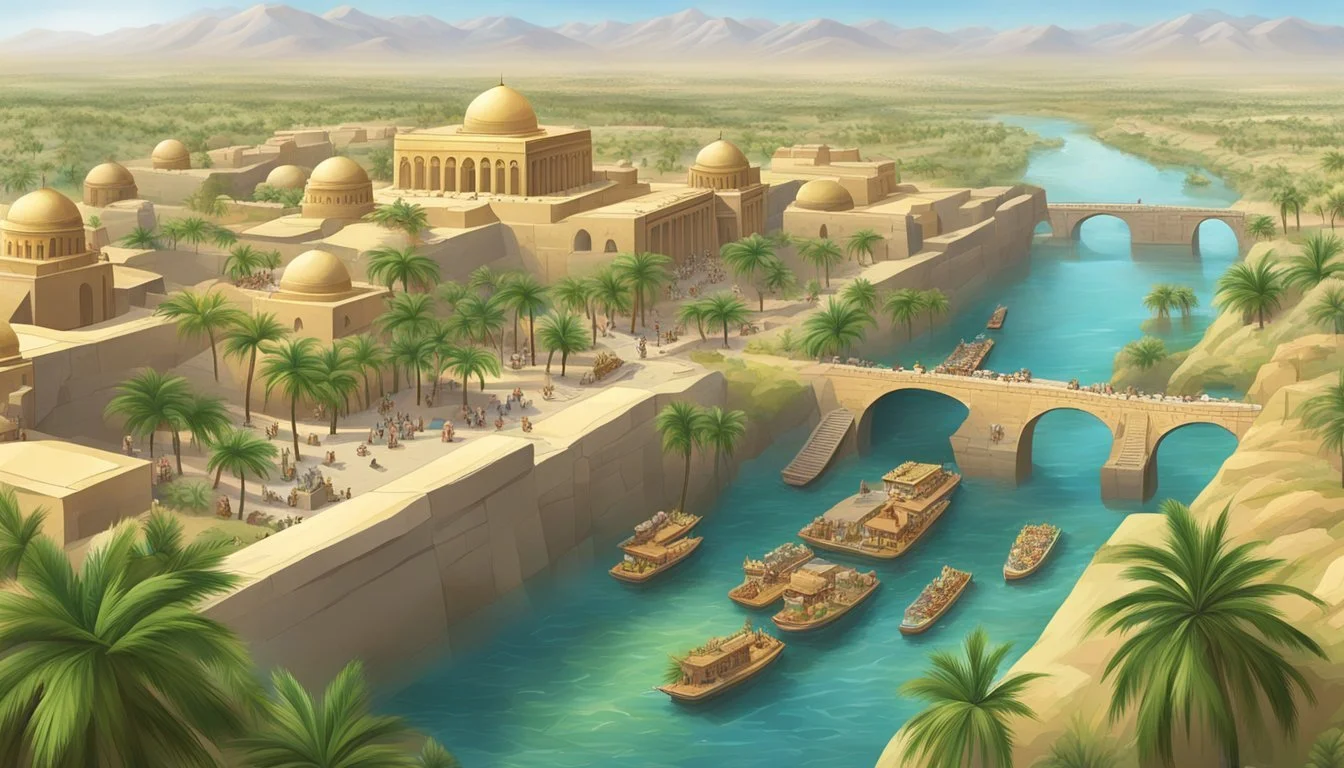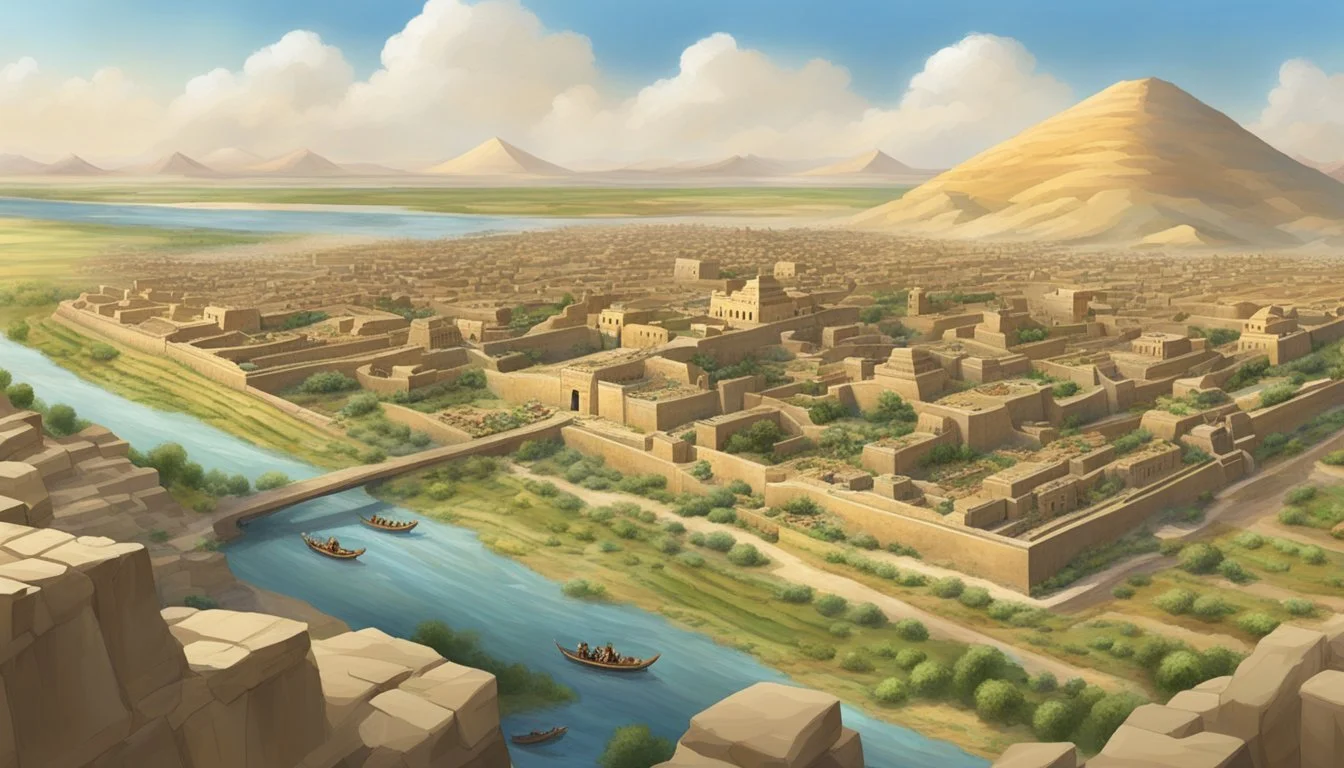10 Documentaries Exploring the History of Ancient Mesopotamia
Unveiling the Cradle of Civilization
Ancient Mesopotamia, often called the cradle of civilization, has captivated historians and archaeologists for centuries. This region between the Tigris and Euphrates rivers saw the rise of some of humanity's earliest complex societies, innovative technologies, and cultural advancements. Documentaries offer a compelling way to explore Mesopotamia's rich history, bringing ancient ruins and artifacts to life through expert insights and visual reconstructions.
For those eager to delve into this fascinating era, numerous documentaries provide in-depth examinations of Mesopotamian culture, politics, and daily life. These films cover various aspects of the region's history, from the emergence of Sumerian city-states to the powerful empires of Akkad, Babylon, and Assyria. By showcasing archaeological discoveries and historical research, these documentaries paint a vivid picture of life in ancient Mesopotamia.
1) 'Ancient Mesopotamia: Life in the Cradle of Civilization' by Blue Brigham
This documentary series offers a comprehensive exploration of Mesopotamian civilization. It covers the region now known as Iraq and Syria, where complex societies flourished for over 3,000 years.
The series delves into the remarkable achievements of Mesopotamians. They mastered irrigation agriculture, allowing them to thrive in a challenging environment. Their innovations in urban planning led to the creation of the world's first complex city-states.
One of the most significant contributions of Mesopotamian culture was the development of writing. This advancement paved the way for literature, law, and record-keeping, fundamentally shaping human progress.
The documentary also examines the political landscape of ancient Mesopotamia. It highlights figures like King Lugalzagesi, who controlled several city-states in the southern region. The rise of Sargon, a powerful successor with mysterious origins, is also explored.
Trade and diplomacy played crucial roles in Mesopotamian society. The series illustrates how these practices helped unite vast regions and facilitated cultural exchange. Despite extensive research, many aspects of this fascinating civilization remain to be discovered.
2) 'Mesopotamia: I Have Conquered' by Timelapse History
'Mesopotamia: I Have Conquered' offers viewers a captivating journey through the rise and fall of ancient Mesopotamian empires. This documentary utilizes advanced animation techniques to bring historical events to life.
The film chronicles the development of early city-states like Ur and Uruk, showcasing their impressive architectural achievements. It explores the emergence of powerful rulers and their conquests across the region.
Viewers are introduced to key figures such as Sargon of Akkad and Hammurabi of Babylon. The documentary examines their military campaigns and the expansion of their respective empires.
'Mesopotamia: I Have Conquered' also delves into the cultural and technological advancements of the era. It highlights the invention of writing, the development of complex irrigation systems, and the creation of influential legal codes.
The documentary provides insights into daily life in ancient Mesopotamia, from religious practices to trade and commerce. It presents a comprehensive overview of this pivotal period in human history.
3) 'The Sumerians: Part of Our First Civilizations' by Extra Credits
'The Sumerians: Part of Our First Civilizations' is an educational animated series produced by Extra Credits. This documentary explores the fascinating world of ancient Sumer, widely recognized as one of humanity's earliest civilizations.
The series delves into the origins of Sumerian culture in Mesopotamia, between the Tigris and Euphrates rivers. It examines key developments like the invention of writing, the creation of complex irrigation systems, and the rise of city-states.
Extra Credits presents information in an engaging, accessible format. The documentary uses colorful animations and clear narration to bring ancient Sumerian society to life for viewers.
The series covers important Sumerian contributions to human progress, including advances in mathematics, astronomy, and literature. It also explores Sumerian religious beliefs and political structures.
'The Sumerians: Part of Our First Civilizations' provides valuable insights into this foundational ancient culture. It offers viewers a concise yet comprehensive look at how Sumerian innovations continue to influence modern society.
4) 'Mesopotamia: The Sumerians' by Simple History
'Mesopotamia: The Sumerians' is an informative documentary produced by Simple History. It offers a concise overview of Sumerian civilization, one of the earliest known societies in ancient Mesopotamia.
The film explores the origins of Sumerian culture, which emerged in the southern region of modern-day Iraq around 4500 BCE. It details the development of their city-states, including notable centers like Ur, Uruk, and Lagash.
Viewers learn about key Sumerian innovations such as cuneiform writing, the wheel, and advanced irrigation systems. The documentary also covers their religious beliefs, featuring discussions on Sumerian gods and temple complexes known as ziggurats.
The social structure of Sumerian society is examined, highlighting the roles of kings, priests, and common citizens. The film touches on significant historical figures like Gilgamesh, the legendary king of Uruk.
'Mesopotamia: The Sumerians' provides insights into daily life, trade, and artistic achievements of this ancient civilization. It uses clear visuals and animations to illustrate complex concepts, making it accessible to a wide audience.
5) 'The Bible's Buried Secrets' by PBS
'The Bible's Buried Secrets' is a documentary produced by PBS's NOVA series. It explores the origins of the Hebrew Bible and the beginnings of monotheism.
The film combines archaeological discoveries from the Holy Land with biblical scholarship. It examines how these findings relate to stories from the Old Testament.
Archaeological evidence presented in the documentary challenges some traditional beliefs about biblical authorship. Scholars suggest that multiple groups of scribes contributed to the first five books of the Bible over several centuries.
The program investigates the roots of modern religion, tracing them back 3,000 years. It presents cutting-edge research and excavations from ancient sites in the Middle East.
Viewers are taken on a scientific journey that connects past and present. The documentary aims to shed light on how ancient texts and artifacts inform our understanding of biblical history.
'The Bible's Buried Secrets' offers a blend of archaeology, history, and textual analysis. It provides viewers with insights into the complex origins of foundational religious texts.
6) 'Mesopotamia: From Nomads to Farmers' by Wondrium
'Mesopotamia: From Nomads to Farmers' is an educational documentary produced by Wondrium. The film explores the transition of ancient Mesopotamian societies from nomadic lifestyles to settled agricultural communities.
The documentary focuses on the Sumerian civilization in southern Mesopotamia. It examines the agricultural practices and technological innovations that led to the rise of early city-states in the region.
Viewers are introduced to the nomadic peoples who eventually became farmers along the Tigris and Euphrates rivers. The film illustrates how these settlers developed irrigation systems to manage the unpredictable river flooding.
'Mesopotamia: From Nomads to Farmers' also covers the emergence of specialized labor and organized religion in Sumerian society. It shows how these developments contributed to the growth of complex urban centers.
The documentary uses a mix of expert interviews, historical reenactments, and archaeological evidence to bring ancient Mesopotamia to life. It provides viewers with a comprehensive look at the foundations of one of the world's earliest civilizations.
7) 'The Kingdom of Ur' by Paul Myles
'The Kingdom of Ur' by Paul Myles offers a detailed exploration of one of Mesopotamia's most significant city-states. This documentary sheds light on the Sumerian civilization that thrived in southern Mesopotamia around 2100-2000 BCE.
Myles examines the archaeological evidence and historical records to reconstruct life in ancient Ur. The film showcases the impressive architectural achievements of the Ur-Nammu ziggurat and the Royal Tombs.
Viewers gain insights into the social structure, religious practices, and economic systems of Ur. The documentary highlights the reign of King Ur-Nammu and his successors, who established a powerful dynasty.
'The Kingdom of Ur' also explores the city's eventual decline and fall. It discusses the factors that led to Ur's demise, including environmental changes and invasions by neighboring peoples.
Through expert interviews and artistic reconstructions, Myles brings the ancient city of Ur to life. The documentary provides a comprehensive look at this crucial period in Mesopotamian history.
8) 'Gilgamesh: The Epic History of a King' by The Study of Antiquity and the Middle Ages
This documentary explores the legendary figure of Gilgamesh, an ancient Sumerian king who became the central character in one of the world's oldest known epic poems. The film delves into the historical context of Gilgamesh's reign in the city-state of Uruk, located in modern-day Iraq.
The documentary examines the development of the Epic of Gilgamesh, tracing its origins from earlier Sumerian poems to the standardized Akkadian version. It highlights the epic's themes of friendship, mortality, and the quest for immortality.
Viewers learn about the archaeological discoveries that have shed light on Gilgamesh's historical existence. The film discusses the epic's influence on later literature and its significance in understanding ancient Mesopotamian culture.
The documentary also explores the epic's portrayal of Gilgamesh as a tyrannical ruler who transforms through his adventures and friendship with Enkidu. It examines the religious and mythological elements woven throughout the narrative, providing insight into ancient beliefs and values.
9) 'Babylonia: The Great City' by Ancient Beast
'Babylonia: The Great City' offers viewers a captivating journey through the history of ancient Babylon. This documentary explores the city's rise to prominence as a cultural and economic powerhouse in Mesopotamia.
The film delves into Babylon's architectural marvels, including the famous Hanging Gardens and the grand Ishtar Gate. It examines the reign of influential rulers like Hammurabi and Nebuchadnezzar II, who played crucial roles in shaping the city's legacy.
Experts provide insights into Babylonian society, discussing daily life, religious practices, and scientific advancements. The documentary highlights the city's contributions to mathematics, astronomy, and literature, including the creation of the Epic of Gilgamesh.
'Babylonia: The Great City' also addresses the city's eventual decline and its lasting impact on world history. Through a combination of historical reenactments and expert commentary, the film brings ancient Babylon to life for modern audiences.
10) 'Hammurabi's Code and the Sumerian Culture' by Academy of Ideas
This documentary explores the profound impact of Hammurabi's Code on ancient Mesopotamian society. It delves into the 282 laws inscribed on a stone stele, which established standards for commercial interactions and justice.
The film examines how Hammurabi's Code promoted fair and impartial justice, a concept that influenced later legal systems. It highlights the code's role in regulating various aspects of daily life in ancient Babylon.
Viewers gain insight into the broader Sumerian culture that preceded and influenced Hammurabi's reign. The documentary discusses earlier law codes, such as the Code of Ur-Nammu, providing context for Hammurabi's legal innovations.
The film also touches on Hammurabi's conquests and his expansion of Babylonian territory. It portrays him as a hands-on ruler who took an active interest in all aspects of governance.
By examining Hammurabi's Code, the documentary sheds light on the values, social structure, and daily life of ancient Mesopotamian civilizations. It illustrates how these early legal principles have shaped modern concepts of justice and law.
Mesopotamian Civilization: An Overview
Mesopotamia, the cradle of civilization, emerged between the Tigris and Euphrates rivers. This ancient region made groundbreaking contributions to human society, shaping the foundations of urban life, writing, and organized government.
Geographical Significance
The fertile lands of Mesopotamia provided ideal conditions for agricultural development. This area, known as the Fertile Crescent, stretched from the Persian Gulf to the Mediterranean Sea. The annual flooding of the Tigris and Euphrates rivers deposited nutrient-rich silt, creating highly productive farmland.
Mesopotamians developed sophisticated irrigation systems to manage water resources. These innovations allowed for surplus food production, supporting population growth and the rise of complex societies. The region's strategic location also facilitated trade, connecting various cultures and fostering economic growth.
Cultural Contributions
Mesopotamian civilization made lasting impacts on human culture. The invention of cuneiform writing around 3200 BCE revolutionized record-keeping and communication. This system allowed for the preservation of laws, literature, and historical accounts.
Mesopotamians established some of the world's first cities, such as Ur and Babylon. These urban centers became hubs of innovation, commerce, and learning. The development of complex legal codes, like the Code of Hammurabi, laid the groundwork for organized governance.
Advancements in mathematics and astronomy were significant. Mesopotamians created a sexagesimal number system and made accurate celestial observations. Their architectural achievements, including ziggurats and elaborate palaces, showcased their engineering prowess.
Religious and Mythological Influences
Ancient Mesopotamian documentaries often explore the rich tapestry of religious beliefs and mythological tales that shaped the region's culture. These films shed light on the complex pantheon of gods and the enduring legends that influenced daily life and artistic expression.
Deities and Beliefs
Mesopotamian religion was polytheistic, featuring a vast array of deities. Documentaries delve into the roles of major gods like Anu, Enlil, and Ishtar. They explain how these divine figures were associated with natural phenomena and human activities.
Films often showcase the grand temples built to honor these gods, such as the Ziggurat of Ur. Viewers learn about the intricate rituals and offerings made to appease the deities and ensure prosperity.
Some documentaries examine the evolution of religious practices across different Mesopotamian civilizations. They highlight how Sumerian, Akkadian, and Babylonian beliefs intermingled and evolved over time.
Epic of Gilgamesh
The Epic of Gilgamesh features prominently in documentaries about Mesopotamian mythology. This ancient tale, considered one of the earliest surviving works of literature, recounts the adventures of the legendary king Gilgamesh.
Films explore the epic's themes of friendship, mortality, and the quest for immortality. They often analyze the flood narrative within the epic, drawing parallels to other ancient flood myths.
Documentaries may showcase archaeological evidence related to the epic, such as clay tablets containing fragments of the story. They might also discuss the epic's influence on later literature and its significance in understanding Mesopotamian values and beliefs.




